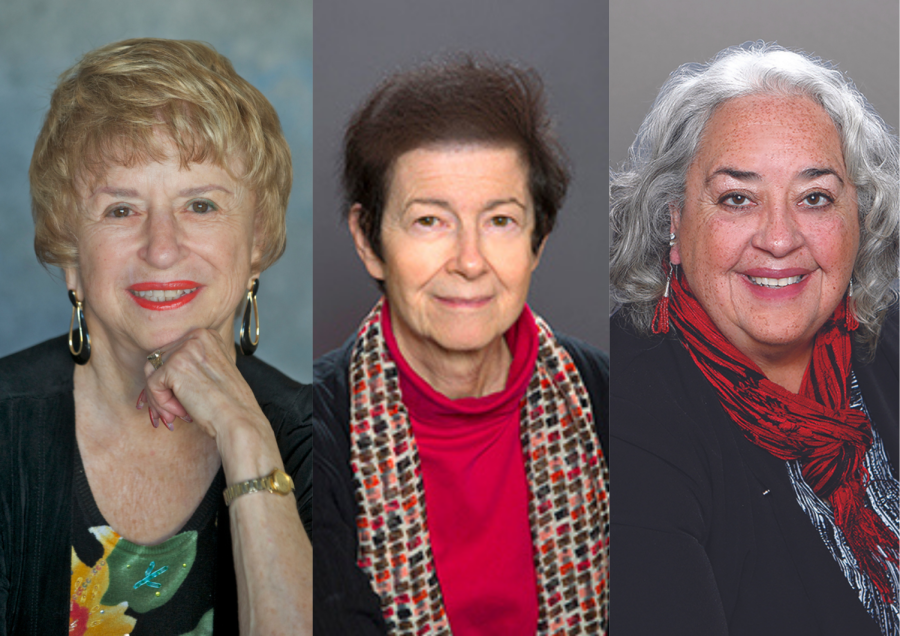The Women’s and Gender Studies Department commenced its annual conference honored by the panel titled of “Feminist Trailblazers and Pathfinders” at UTEP March 21-22 at UTEP. The panel was an opportunity for the UTEP community to get to know and learn about the renowned trajectories of faculty and staff; Mimi Gladstein, Ph.D., Sandra McGee Deutsch, Ph.D., and Yolanda Chavez Leyva, Ph.D., and Dee Woo.
Gladstein is known for her involvement with the College of Liberal Arts and her activism towards women’s opportunities in education. She is also known for being former chair of the English Department, former chair of the Theater, Dance and Film Department, and the first director of the Women’s and Gender Studies Department.
Gladstein is known among her students and colleagues as a leader, who always strives to bring out the potential of the UTEP community.
One of her biggest accomplishments in education was to achieve equal pay rates at the university back in the 1980s. She sued the University for discriminatory employment practices based upon sex, resulting in women getting paid less than men in similar positions.
With her involvement in the UTEP community, she aims to set a great example for faculty, staff, and students. She has not only encouraged her students to seek an education, but to be in love with what they do, and fight for what they stand for.
“Students came to me, when I was an undergraduate advisor, you know, Dr. Gladstein, I’m interested in this. Still, my parents think if I want a career, I should be an accountant or I should be the standard or the other. And I said to them, how much is your life worth to you?” Gladstein said.
“I said, you know, I like the weekends. But I’m happy when Monday comes, too. How would you like it if all your life you dreaded the week to come? Do you dread going into your work? You know, is it worth it?” Gladstein said.
Deutsch is known in the History Department as a professor with a strong value system, and as a professor who is not afraid to stand up against ideologies that might affect an individual’s dignity, even if this means to publicly correct her students. She has written and published three books. She specializes in Latin American fascism and antifascism, and women and gender in Latin America.
Coming from a family who survived the Holocaust, she grew up surrounded by history, and after her mother contacted family in Latin America, Deutsch became interested in the region. During her visit in Argentina as a scholar, she encountered the fascist ideology among her peers, which made her take the decision to focus on the topic. She made it a goal of hers to perform research to understand antisemitism and its motives, as a response to the suffering of her parents.
As a first-generation college graduate, she was encouraged by her parents, despite their old school conservativism to seek higher education. Thus, she made it her goal to encourage her students, especially women to have big goals set and a motive of action.
“I have always encouraged the department (of history) to really look closely at the women candidates, because unfortunately in the past and even now we have been a majority male department, and that does not reflect the percentage of men and women who get history Ph.D. degrees,” Deutsch said.
Chavez Leyva serves as the director of the Institute of Oral History, director of the Borderlands Public History Lab, and associate professor of the History Department. Aside from her work at UTEP, she has her website Fierce Fronteriza, in which she shares her work showcasing women and the borderland area.
“I have gathered stories as an historian, working in archives and libraries. But most meaningfully I have listened to the stories of border people, of fronterizos. I have shared these histories through history projects ranging from museum exhibits to dialogues to podcasts,” wrote Leyva wrote on her blog.
She has 14 publications, in which she compiles narratives from women, immigrants at the borderland and native culture. She also has blog entries, in which she discusses the struggles people have in the area, such as the 2019 Walmart Shooting.
Woo has worked as KTEP’s operations director and has been in the broadcasting business for over three decades. Graduating from UTEP with a degree in mass communication, she went on to work for Channel 4 in El Paso and radio stations in Arizona, according to the KTEP website.
Despite her not being a professor, she has impacted UTEP students and KTEP listeners in a big way.
“Dee has been at KTEP for many years, so much that when she was away during the pandemic, listeners called during my shift asking for her,” said former KTEP intern Victoria Almaguer. “Her resilience and strength continuing to work for KTEP no matter what life throws at her inspires me.”
To learn more about the Institute of Oral History and access these recordings, visit https://www.utep.edu/liberalarts/oral-history/.
Maria L. Guerrero Duran is the web and copy editor and may be reached at [email protected]; @bymariaguerrero on Instagram; @malysaguerrero on Twitter.












